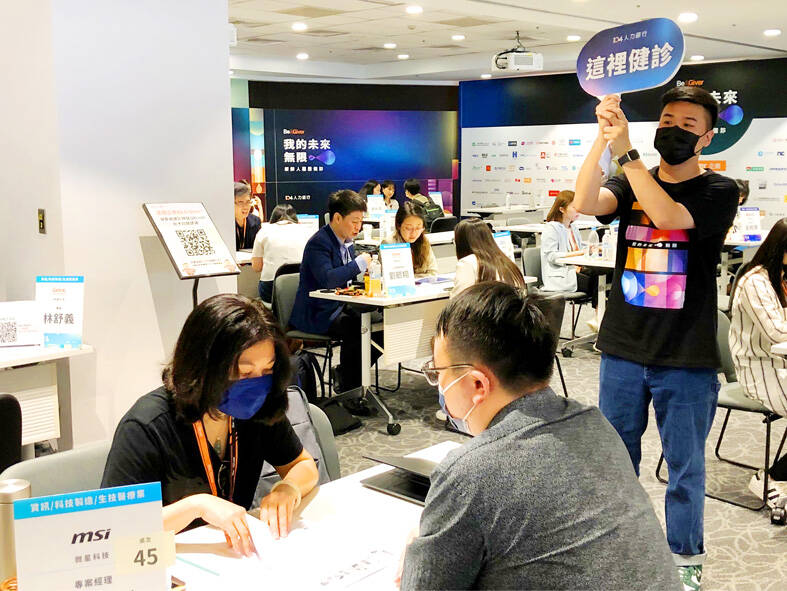The number of job vacancies hit 1.04 million this month, having remained above 1 million for the past nine straight months, as firms seek to secure sufficient workers ahead of the holiday season, the online 104 Job Bank (104人力銀行) said yesterday.
The number of vacancies represents an increase of 4.2 percent from the same time last year, with hotels and restaurants accounting for 215,000, retailers, direct selling and wholesale operators contributing 168,000, and electronics, software and semiconductor firms providing another 15,5000, the job bank said.
“It may become a new normal for job vacancies to exceed 1 million,” due to Taiwan’s rapidly aging population, the job bank said, adding that Taiwan’s population has declined for the past three consecutive years, with a record low of newborns at 138,000 last year.

Photo: CNA
If the trend remains unchanged, the workforce will downsize further, a phenomenon that is reinforced by changes in values among young people, it said.
Young people today do not consider it a virtue to follow their supervisors’ orders and assign less importance to loyalty, different surveys of the working population showed.
Young people also do not like to work overtime, considering their own wellness and rights to be more important. When forced to work overtime, young people tend to demand extra pay and fight to guard their rights and interests, it said.
Relative flexibility and freedom explain why young people prefer to work as couriers for e-commerce and food delivery service providers rather than making beds and waiting tables, it said.
An increasing number of employers have turned to middle-aged and elderly applicants to join their payroll, the job bank said in an earlier survey.
Such recruitment advertisements amounted to 194,000, making up 18.5 percent of the overall vacancies, 1.66 times higher than four years ago, it said.
The figures reveal that more than 50 percent of employers remain unwilling to hire middle-aged and older people, it said.
At the same time, 85 percent of middle-aged and elderly jobseekers said they still need to work for financial and other reasons and they care the most about working locations, followed by job requirements and wages, it said.
Labor-intensive manufacturers and service providers need to recognize middle-aged and elderly people are an importance human resource that can help relieve labor shortages, the job bank said.
The Ministry of Labor yesterday again rejected pleas by the hospitality sector to hire foreign workers to bolster their businesses, saying a continued mismatch between compensation offers and wage expectations account for their lack of manpower.
The nation’s labor pool remains underdeveloped and employers should adjust and offer better pay to deal with the matter, the ministry said.

The US dollar was trading at NT$29.7 at 10am today on the Taipei Foreign Exchange, as the New Taiwan dollar gained NT$1.364 from the previous close last week. The NT dollar continued to rise today, after surging 3.07 percent on Friday. After opening at NT$30.91, the NT dollar gained more than NT$1 in just 15 minutes, briefly passing the NT$30 mark. Before the US Department of the Treasury's semi-annual currency report came out, expectations that the NT dollar would keep rising were already building. The NT dollar on Friday closed at NT$31.064, up by NT$0.953 — a 3.07 percent single-day gain. Today,

‘SHORT TERM’: The local currency would likely remain strong in the near term, driven by anticipated US trade pressure, capital inflows and expectations of a US Fed rate cut The US dollar is expected to fall below NT$30 in the near term, as traders anticipate increased pressure from Washington for Taiwan to allow the New Taiwan dollar to appreciate, Cathay United Bank (國泰世華銀行) chief economist Lin Chi-chao (林啟超) said. Following a sharp drop in the greenback against the NT dollar on Friday, Lin told the Central News Agency that the local currency is likely to remain strong in the short term, driven in part by market psychology surrounding anticipated US policy pressure. On Friday, the US dollar fell NT$0.953, or 3.07 percent, closing at NT$31.064 — its lowest level since Jan.

The New Taiwan dollar and Taiwanese stocks surged on signs that trade tensions between the world’s top two economies might start easing and as US tech earnings boosted the outlook of the nation’s semiconductor exports. The NT dollar strengthened as much as 3.8 percent versus the US dollar to 30.815, the biggest intraday gain since January 2011, closing at NT$31.064. The benchmark TAIEX jumped 2.73 percent to outperform the region’s equity gauges. Outlook for global trade improved after China said it is assessing possible trade talks with the US, providing a boost for the nation’s currency and shares. As the NT dollar

The Financial Supervisory Commission (FSC) yesterday met with some of the nation’s largest insurance companies as a skyrocketing New Taiwan dollar piles pressure on their hundreds of billions of dollars in US bond investments. The commission has asked some life insurance firms, among the biggest Asian holders of US debt, to discuss how the rapidly strengthening NT dollar has impacted their operations, people familiar with the matter said. The meeting took place as the NT dollar jumped as much as 5 percent yesterday, its biggest intraday gain in more than three decades. The local currency surged as exporters rushed to